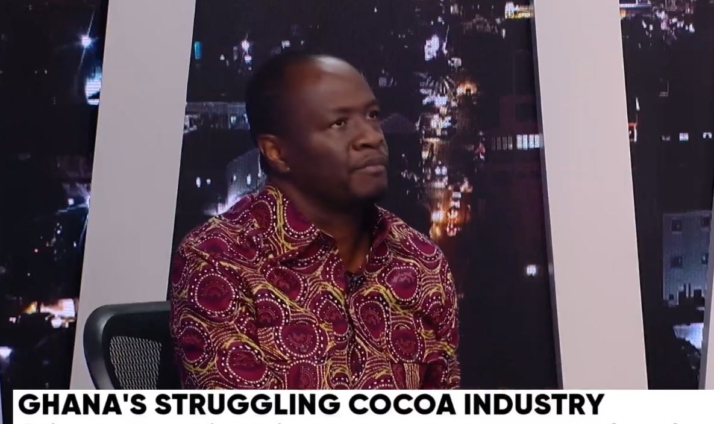The Public Affairs Manager of Cocobod, Fiifi Boafo, has attributed the decline in production to adverse weather conditions.
According to him, the significant impact of weather patterns on cocoa cultivation, including heavy rainfall at the start of the cocoa season is a primary concern.
While acknowledging that rainfall is essential for cocoa production, he noted that the excessive precipitation experienced this season hindered the fruiting process, thus reducing the expected harvest.
Furthermore, Mr Boafo highlighted the detrimental effects of severe harmattan conditions on cocoa pods, exacerbating the situation.
Mr Boafo gave this explanation when he was contributing to a discussion on Ghana’s struggling cocoa industry on JoyNews’ PM Express on Wednesday, March 27.
“The major contributory factor for low cocoa production is the weather situation we’ve experienced this cocoa season. It started with a heavy rainfall. Then it got to a time where you expected the pods you had to develop for you to harvest then we experienced severe harmattan.
“So this El Niño challenge is largely a contributory factor to the low production we experienced this year,” he told host Evans Mensah.
Mr Boafo also highlighted the swollen shoot disease that has plagued cocoa production.
Giving more details, he said about 590,000 hectares of cocoa farms in Ghana have been affected by the said disease.
Given that, these farms are under rehabilitation and are not producing cocoa beans at the moment.
“At the moment, about 590,000 hectares of cocoa farms in Ghana have been affected by swollen shoot and so it is affecting production. Indeed, we are rehabilitating some of these affected farms. And since the only known solution is cutting the affected trees, all the affected farms are not fruiting at the moment, “he said.
Ghana, one of the world’s leading cocoa producers, has been grappling with declining cocoa production in recent years.
The challenges posed by unpredictable weather patterns, illegal mining, and smuggling among others further exacerbate the already existing pressures on the industry, with repercussions felt both domestically and globally.
Currently, there is a global shortage of cocoa beans, thus shooting up the price of one tonne of cocoa to an unprecedented amount of $10,000.
However, research shows that Ghana might not significantly benefit from this increment since cocoa production has also significantly dropped this year.
Latest Stories
-
OmniBSIC Bank returns for 2025 JoySports Invitational Tournament
2 minutes -
Photos: Ghana defeat Niger to finish third in WAFU-B U20 Boys Cup
50 minutes -
Star Assurance signs up for JoySports Invitational Tournament
1 hour -
Indigenous firm Duytlex partners with Petro-Canada Lubricants to expand footprint in Africa
1 hour -
JAPTU Ghana pays courtesy call on IGP Yohuno, POMAB members
1 hour -
The healers who were left behind: A tale from Nunyãdume
2 hours -
Telecel bridging digital divide through KNUST SONSOL Programme
2 hours -
2025 Mid-Year Budget: Trade expert calls for single-digit inflation to strengthen economy
2 hours -
From Doubt to Dreams: Telecel’s 2Moorch Money Promo changes a nurse’s life
2 hours -
A strong cedi that Ghana does feel – policy and market behaviour
2 hours -
GIPC facilitates 2,000 jobs following milestone aftercare intervention
2 hours -
2025 Mid-Year Budget: Economy is on steady course – Trade Expert
2 hours -
Stanbic Investment Management Services Ltd announces strong 2024 performance
2 hours -
Banking is necessary, but banks are not: Ghana’s digital finance disruption story
3 hours -
Ghana set to sign bilateral debt agreements today under G-20 framework
3 hours

